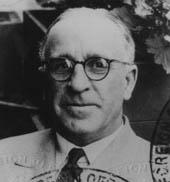
During World War II, some individuals and groups helped Jews and others escape the Holocaust conducted by Nazi Germany.

Georg Ferdinand Duckwitz was a German diplomat. During World War II, he served as an attaché for Nazi Germany in occupied Denmark. He tipped off the Danes about the Germans' intended deportation of the Jewish population in 1943 and arranged for their reception in Sweden. Danish resistance groups subsequently rescued 95% of Denmark's Jewish population. Israel has designated Duckwitz as one of the Righteous Among the Nations.

Righteous Among the Nations is an honorific used by the State of Israel to describe non-Jews who risked their lives during the Holocaust to save Jews from extermination by the Nazis for altruistic reasons. The term originates with the concept of "righteous gentiles", a term used in rabbinic Judaism to refer to non-Jews, called ger toshav, who abide by the Seven Laws of Noah.

Major Francis "Frank" Edward Foley CMG was a British Secret Intelligence Service officer. As a passport control officer for the British embassy in Berlin, Foley "bent the rules" and helped thousands of Jewish families escape from Nazi Germany after Kristallnacht and before the outbreak of the Second World War. He is officially recognised as a British Hero of the Holocaust and as a Righteous Among the Nations.

Irene Gut Opdyke was a Polish nurse who gained international recognition for aiding Polish Jews persecuted by Nazi Germany during World War II. She was honored as a Righteous Among the Nations by Yad Vashem for risking her life to save twelve Jews from certain death.

Jānis Lipke was a Latvian rescuer of Jews in Riga in World War II from the Holocaust in Latvia.

Père Marie-Benoît was born Pierre Péteul. As a Capuchin Franciscan friar he helped smuggle approximately 4,000 Jews into safety from Nazi-occupied Southern France. On 1 December 1966, he was honored with the Medal of the Righteous among the Nations for his courage and self-sacrifice. His actions to save Jews during the Holocaust were the reason for his epithetFather of the Jews.
Yad Vashem, the state of Israel's official Holocaust memorial, has generally been critical of Pope Pius XII, the pope during The Holocaust. For decades, Pius XII has been nominated unsuccessfully for recognition as Righteous Among the Nations, an honor Yad Vashem confers on non-Jews who saved Jewish lives during the Holocaust altruistically and at risk to their own lives.
Don Raimondo Viale was an Italian Catholic priest, whose name is entered among the Righteous Among the Nations at Yad Vashem for his work on behalf of the Jews during the Holocaust.

Ivan "Ivica" Vranetić was a Yugoslav partisan of ethnic Croatian descent, whose aid to Jewish people during World War II resulted in his inclusion among the "Righteous Among the Nations" by Yad Vashem in 1970. For more than two decades, he was Chairman of the Righteous Among the Nations organization.

Julian Bilecki (1928–2007) was a Polish farmer who helped his family save 23 Jews as a teenager during the Holocaust in Poland. Decades later, they were recognized as Righteous Among the Nations for their actions.

Manuel Muñoz Borrero was an Ecuadorian diplomat who issued approximately 100 Ecuadorian passports to save Jews during the Holocaust. He is the only Ecuadorian to be recognized by Yad Vashem as a Righteous among the Nations.

Maria Schauer was an Austrian recognized by Yad Vashem as a Righteous Among the Nations, after rescuing three Jews from deportation and possible death after Nazi occupation of Austria during World War II.

Don Aldo Brunacci was the pastor of the San Rufino Cathedral.

The Hardaga family was a traditional Muslim family that lived in the capital of Bosnia and Herzegovina, Sarajevo. The house where they lived was inhabited by Mustafa and his wife Zejneba, Mustafa’s brother Izet and his wife Bahrija.
Henryk Rolirad was a Polish food–systems engineer who was recognized as a Righteous among the Nations for saving Jews during World War II.







